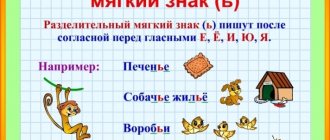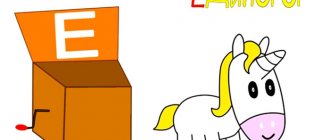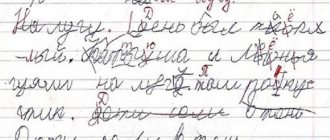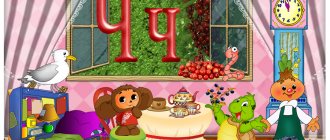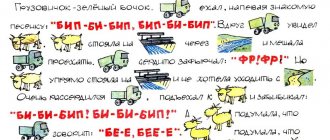A fairy tale about the letter R, author - Daria Luch.
The letter R was the most joyful letter in the Alphabet! Of course, “joy” and all joyful words begin with the letter P! That's why the letter P always walked around and sang a song:
- Ra-ra-ra! Ra-ra-ra! I'm glad this morning!
The letter P also helped boys and girls learn to pronounce it correctly. It is very difficult. Not everyone succeeds. Some people spend their entire lives pronouncing the letter R incorrectly. And there is even a whole country, France, where everyone pronounces the letter R completely differently. In French, not Russian. Therefore, it is important for children to learn how to pronounce the letter R.
The word “Motherland” and the word “Russia” and “Russian language” also begin with this letter! That's how important the letter R is.
But, although she was important, she was not at all self-important, but was simple and kind.
One day the letter P went for a walk and reached a river. The river was so clean, beautiful, and fish swam there. The letter R began to swim, dive and play with the fish.
So they happily played and had fun for a long time, and then the letter R swam ashore and began to change clothes. And suddenly she felt that someone was moving in her swimsuit.
- Oh! Who could it be? - exclaimed the letter R and took out... Who did you think? Goldfish!
She was so beautiful, bright orange, like the sun, and spoke in a human voice.
- Oh, fish, swim quickly to your river, you can’t be without water! - and the letter P quickly released the fish into the river.
And the fish says to her:
- Thank you, letter R! Because you are so kind and joyful, I will fulfill one of your wishes, your strongest! Speak!
The letter R thought about it. What was her strongest desire? She thought and thought, and then she said:
Collocations (45)
- excellent work
- work on yourself
- work force
- workplace
- workplaces
- the working process
- as well as
- equally
- glad to see
- nice to meet you
- Nice to meet you
- every now and again
- Once and for all
- a piece of cake
- once or twice and got it wrong
- Debriefing
- except that
- various kinds
- put into pieces
- various kinds
- allow me to take my leave
- pattern break
- Sooner or later
- endearing
- mood
- consider
- consumables
- project implementation
- we're talking about
- this is about
- problem solving
- solution
- solve the problem of
- a rhetorical question
- born in a shirt
- motherland
- motherland
- native language
- soul mate
- hand in hand
- close at hand
- Russian language
- handmade
- labor market
- market economy
On this page you can find the most popular words starting with "r" (at the beginning of the word - R). The list is sorted alphabetically. You can add your options in the comments. If you click on a word, its synonyms and meanings will open.
See also: words containing R.
Open page 2 of words starting with r →
- The search took 0.008 seconds. Remember how often you look for something to replace a word with? Bookmark sinonim.org to quickly search for synonyms, antonyms, associations and sentences (press Ctrl+D).
Just two rules
The “rebus method” is, first of all, a game, and an oral game at that. In order to understand the sound principle of our game, it is necessary to perform all the tasks we have indicated out loud, loudly and rhythmically. Our child does not yet know letters, does not yet know how to read, and therefore is able to rely only on spoken words and sounds.
Our game has only two rules. The first rule is how to distinguish by ear from a whole word its first sound structure (in the word MASK not the first letter M and not the first syllable MAS , but precisely the first warehouse MA ). For a four-year-old child, this is no problem, and within two or three minutes the baby masters our first rule. The second rule is how to select their first words from several whole words, loudly and rhythmically pronounced out loud one after another, and understand the new resulting word.
From the very first minutes of the first lesson, children are captivated by the amazing transformations of one word into another. The teacher’s task at these moments is to demonstrate the rules of the game and restrain himself from unnecessary explanations. There is no need to explain to your child what a sound, syllable or sound structure is. There is no need to tell what and how many letters the warehouse is written with. You don't even need to show pictures or objects. You just need to say clearly and rhythmically, like rhymes:
mask - MA palm tree - PA mouse - WE cone - SHI cat - KO spoon - ...
Here it is recommended to take a short questioning pause. Let the child understand that he is invited to participate in this game. But there is no need to wait for an answer, continue further:
... - LO ball - MY teapot - HA branch - VE net - ... handle - RU Bug - ...
Children really enjoy playing with names in this oral game:
Kolya - KO Olya - O Masha - MA Dasha - YES Petya - PE Fedya - FE Ira - I Kira - KI, etc.
The names, of course, should be familiar to the child. Any adult can easily select two or three dozen suitable words. The only thing that needs to be taken into account: each word must begin with an accent, because unstressed vowels change their sound ( katenok, bear ).
The rebus method allows you to conduct classes with children who are already reading and with children who have not yet read simultaneously in the same group. Features of the method are the possibility of oral play, which completely imitates all the mechanisms of reading. The principle of reading is understood by children in a matter of minutes. Extremely exciting for children, very convenient for teachers, and absolutely understandable for parents.
As soon as the child understands the rule mask - MA and begins to echo the teacher, you can move on to the next step. Again, no unnecessary explanation is required, you just need to say clearly and rhythmically:
mask-mask - MA-MA palm-palm - PA-PA shoes-teapot - TU-CHA chicken-teapot - KU-... mask-ball - MA-... cactus-ball - ...
Two words - it's quite easy. It is more difficult to keep in mind three words:
mask-pinecone-pillowcase - MA-...-... mask-leaf-pillowcase - MA-...-... beads-mask-tie - BU-...-... tie-zebra-sneakers - ...
As a rule, children 4-5 years old quite easily solve three-word tasks by ear from the first lesson. But tasks with four words cause difficulties even for six-year-olds:
beads-cancer-tiger-scissors - ... letters-cancer-bear-lady - ... cloud-girl-box-spoon - ... hen-hen-pen-hare - ...
Children forget the original words, lose the sequence of sounds, try to “guess” the final word and often make mistakes. Lack of concentration and inability to concentrate. On the one hand, for the sake of developing these important qualities, it would be worth continuing such oral training. But you can also make the task easier by finally giving the child visual support in the form of objects or their drawn images.
When visible objects appear, the process of real reading begins. It is necessary to promptly and repeatedly indicate to children the direction of reading. Without prompting from an adult, children try to name the elements from right to left. And they achieve this with amazing consistency.
It is to these simple actions that the role of the teacher in our methodology comes down. No complicated explanations, no long preparatory stages, no multi-part role-playing stories used today by teachers with the sole purpose of entertaining a child who is bored in class and making the lesson fun. In the “Rebus Method”, children are quite passionate about the reading process itself, and children enjoy this process.
By the decision of the expert council of the St. Petersburg Education Committee dated December 25, 2009, the “Rebus method - teaching reading using syllabic pictograms” was approved for use in elementary schools as an additional teaching method.
Of course, not all children are equally successful in learning. If a teacher conducts a lesson with a whole group of children, then the most intelligent and active students become a “model” for the lagging child: do as they do, catch up with them, get ahead of them, compete with them. If an adult is working with only one child, and he suddenly does not understand the rules of the game, well, you can always stop and put it off until next time.
It may very well be that the child is still too young for such exercises; he does not yet understand what the beginning of a word is and what this adult generally wants to achieve from him. We strongly advise against engaging in such games with children whose speech skills and concepts have not yet been established. For example, three-year-old children are able to seriously transfer the rules of shortening words into everyday communication and thereby provoke an artificial delay in speech development. If a child still does not have enough memory, attention, abstract thinking, and, if you like, a sense of humor to master the “Rebus method” - this can be observed at four, five, or even six years old - then with this child It’s just too early to start reading, syllabic-pictographic or even more so phonemic-letter. The “Rebus method” is both a good training and an accurate testing exercise.
Battle with a mosquito
Arkady lay in bed and leafed through an interesting magazine. Suddenly a nasty mosquito squeak was heard above his ear. Arkady rolled the magazine into a tube and tried to swat the mosquito.
At first the blows rained down on the bed with a roar. Then Arkady began drumming the magazine on the curtains and paintings. Soon it was the TV's turn.
However, the little mosquito stubbornly continued to fly around the room. While running after the mosquito, the enraged Arkady broke a crystal vase and then knocked over the floor lamp... Exhausted, Arkady sat down in a chair and closed his eyes. A nasty mosquito squeak was heard nearby...
That's the game!
Roma came to the senior group of kindergarten for the first time. He ran to the toys. The building made of cubes was destroyed. The door of the truck was torn off. The robot was thrown into an aquarium with fish.
Then Roma went to the most elegant girl, Raya. Pulling her sleeve, Roma said loudly: “Let’s play war!”
Raya looked at Roma, then at the mess he had created in the group, and quietly answered: “You’ve already played the war!”
Good leopard
A Rabbit stood on the road to the circus and cried loudly. An old Leopard passed by and asked: “Who upset you, short-tailed one?” The Little Rabbit, sobbing, replied: “I lost my ticket. But the angry Crow doesn’t let me through.”
Old Leopard thought. Then he suggested to the Rabbit: “Stop crying! We will outwit Crow. Place a loaf of bread under your arms and walk next to me.”
The proud Leopard and the Rabbit, trembling with fear, approached the circus. The stern Crow let the Leopard through, and blocked the road for the Rabbit with the loaves. “I won’t let you into the circus without a ticket!” - Crow croaked. The Leopard took on a menacing look and objected to Crow: “Don’t you understand, Crow, that I can get hungry at the circus?” And, pointing at the Rabbit, he growled: “And this is my hamburger!”
Incident at a construction site
Fedor worked at a construction site as a plasterer. He was finishing an apartment on the second floor of a building under construction.
One morning there was a strong wind. He whistled through the frames, scattered bricks, and tore off the workers' storm boots. But the worst thing was that the wind was rocking the crane. At any time it could collapse on the built house.
Fedor and other workers secured the crane with cables. Soon the wind died down. The builders resumed their normal work.
Weed chickens
It turns out that the simple chicken Ryaba has many different relatives in the world. Chicken relatives include partridge, black grouse, and capercaillie. Even a small quail is a direct relative of the chicken.
All listed birds produce offspring in the same way. For many days in a row they warm the eggs with their warmth.
But in Australia there live special, weed chickens. They set up an interesting incubator: they rake various rubbish into a pile or bury their eggs in hot sea sand. In such an incubator, nimble chicks quickly appear and begin to fly on the very first day.
Torn shirt
Sergei was playing in the yard. He climbed the fence and tore the sleeve of his new shirt. Sergei was afraid that his mother would scold him. He returned home and hid the shirt in his dirty laundry.
Soon my mother returned from work and discovered a torn shirt. Mom was upset. She called Sergei and said: “I will punish you, Seryozha. But not because he tore his shirt. And for hiding the truth!”
Carnival costume
The New Year holiday was approaching. All the kindergarten children, together with their parents, prepared carnival costumes.
Fyodor decided to make a Pinocchio costume himself. He smeared his cheeks with red blush. Then I cut the cardboard and tried to roll it into a tube. But the cardboard unrolls, the tube doesn’t come out...
“I’ll tie the cardboard with an elastic band, attach it to the bridge of my nose, and I’ll be a rhinoceros,” Fyodor decided. I took the rubber band. I tied it, tied it, nothing came of it.
Fyodor got angry and shouted: “I’m tired of this rhinoceros! I’ll come to the kindergarten after the holiday and say that I dressed up as invisible. The guys in the group didn’t even notice me!”
Sparrow on the roof
Little Sparrow sat on the roof of a huge brick house and looked carefully into the yard. Down there, a kind old woman stood near the garages and fed the birds. From a transparent bag she poured cereals, grains and bread crumbs onto the ground.
First a flock of gray sparrows arrived. But soon three large black crows swooped down on the sparrows and drove them away from the food.
Little Sparrow, who was watching what was happening, became angry. He fluffed his feathers and chirped loudly: “When I grow up, I will definitely become a Crow!”

